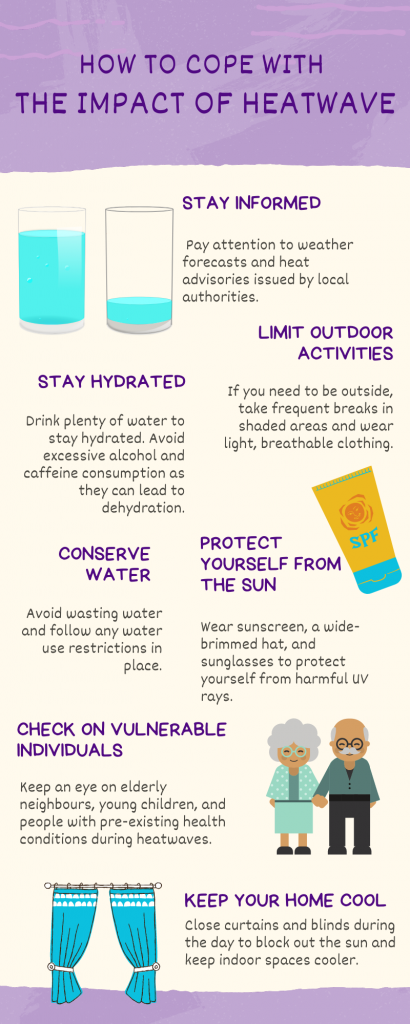How to cope with Heatwaves
 A heatwave is a prolonged period of excessively hot weather, which can have significant impacts on both humans and the environment. Some of the potential consequences of a heatwave include:
A heatwave is a prolonged period of excessively hot weather, which can have significant impacts on both humans and the environment. Some of the potential consequences of a heatwave include:
• High temperatures can lead to heat-related illnesses such as heat exhaustion and heatstroke, especially in vulnerable populations like the elderly, children, and people with pre-existing health conditions. It can also worsen respiratory and cardiovascular problems.
• Heatwaves can increase water demand for drinking, irrigation, and industrial use, putting stress on water supplies. Droughts during heatwaves can lead to water shortages and impact agriculture, ecosystems, and energy production.
• As temperatures rise, there is an increased demand for cooling, which can strain energy grids and lead to power outages or blackouts.
• Heatwaves can negatively affect crop yields, decrease livestock productivity, and put stress on agricultural systems. This can lead to food shortages and higher food prices.
• Prolonged heat and dry conditions can increase the risk of wildfires. These can have devastating effects on ecosystems, wildlife, property, and human lives.
• Extreme heat can cause infrastructure, such as roads, railways, and buildings, to expand and contract, leading to potential damages and increased maintenance costs.
The cumulative effect of all the above factors can have a significant economic impact on affected regions and countries.
It is essential for communities to be prepared for extreme heat events by implementing heat action plans and raising awareness about the risks associated with heatwaves. It’s important to note that while individual heatwaves can be influenced by specific weather patterns, long-term changes in climate due to global warming play a significant role in the increasing occurrence of heatwaves worldwide. As our planet continues to warm, it’s likely that heatwaves will become more frequent and severe in the future. This highlights the importance of taking measures to mitigate climate change and adapt to its impacts to minimize the negative effects of heatwaves on human societies and the environment.

